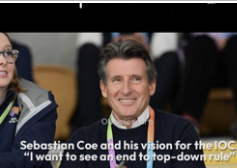Sebastian Coe, President of World Athletics and candidate to lead the International Olympic Committee (IOC), has set out a clear agenda for the future of the Olympic movement.
Coe stressed the need for structural changes to ensure the growth and sustainability of the body.
“The future of our movement will depend on our clarity of thought, vision, leadership and execution,” Coe said.
According to him, this can only be achieved by harnessing the experiences and skills of all IOC members and stakeholders. “Only in this way we can energise this great movement and meet the challenges and opportunities that lie ahead,” he added.
For Coe, the key to success lies in reforming the IOC’s governance. “Commitments to inclusivity and empowerment are easy to make, but much harder to deliver,” he said.
He warned that without organisational structures to decentralise power, promises will remain mere words.
Coe proposes an approach in which commissions operate efficiently and contribute to the decision-making process of the Executive Committee.
“I want to see an end to ‘top-down’ governance, where the Executive Committee instructs the office of the President and not the other way around,” he said.
The candidate also advocates a fundamental balance in the roles of members and the Executive Committee. “Members should decide and the Executive should implement those decisions. That’s the way it should be, but that’s not the way it works now,” he said.
Coe emphasised the importance of fostering a culture in which all stakeholders can contribute their analysis and perspectives.
In his experience at the helm of World Athletics, Coe implemented decentralisation systems that empowered federations and strengthened regional development centres. “I’m not looking to destroy existing structures, but to subject them to accelerated evolution,” he said.
“The current system may have produced a glorious four weeks in Paris, but it would be a catastrophic mistake to take that as an argument against major change,” Coe said.
According to him, embracing change is essential to ensure that the Olympic movement thrives in an uncertain world.
“We owe this transformation to the next generation. We cannot wait any longer,” Coe concluded, making clear his vision for a more inclusive, efficient IOC that is ready for the challenges of the future.


Thank you for your sharing. I am worried that I lack creative ideas. It is your article that makes me full of hope. Thank you. But, I have a question, can you help me?